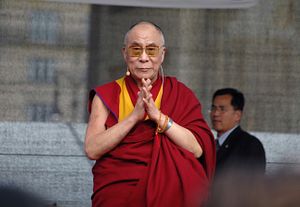There has been quite a bit of movement between the Chinese government and the exiled Dalai Lama in the past two weeks. The maneuvering by both sides has not quite begun to add up to a logical conclusion, as they each seek to find a peaceful conclusion to the decades-old problem without losing ground. The Chinese leadership under President Xi Jinping not only has the upper hand, but through a mixture of massive infrastructure investment, immigration of ethnic Chinese, and a strong security apparatus may now feel secure enough to negotiate a possible return for the 14th Dalai Lama; one that might actually help diffuse Tibet’s heightened tensions since 2008 and make it a more peaceful, secure buffer zone for China.
The exiled spiritual leader of Tibet sent a shot across China’s bow earlier this month when he indicated that he might become the last of his line, telling the German newspaper Welt am Sonntag that “Tibetan Buddhism is not dependent on one individual. We have a very good organisational structure with highly trained monks and scholars.” China then put itself in the awkward situation of having to defend Tibetan Buddhist spirituality, saying through its foreign ministry spokesman that “The title of Dalai Lama is conferred by the central government, which has hundreds of years of history. The 14th Dalai Lama has ulterior motives… which is damaging to the normal order of Tibetan Buddhism.” The ability to decide who will be the next Dalai Lama is incredibly important, as it could mean the continued existence of threat to China’s sovereignty beyond its borders, or possibly the end of the issue if China were able to influence the selection.
Beyond the issue of succession, however, it appears both sides are considering a potentially more stable solution. Shortly before Xi was set to visit India on September 18, the Dalai Lama offered faint praise for the president, saying he “is more open-minded. His thinking is more realistic,” and that “he can learn more from India.” The day before, a blog post on China’s Sina stated that, “according to informed sources familiar with the situation,” the Dalai Lama’s return was a “win-win.” The post outlined the structure of a deal in which the Dalai Lama would be able to come to China and visit Wutai Shan, a mountain he has often expressed interest in and that is sacred to both Chinese and Tibetan Buddhists, and visit with Chinese officials of at least Standing Committee stature. The Sina post also noted that deputy secretary of the Tibet Autonomous Region, Wu Yingjie, earlier said that “Beijing has started negotiations with the Dalai Lama’s personal envoy for the Dalai Lama to return to Tibet,” and “if the Dalai Lama and those close to him accept that Tibet is a part of China and abandon their separatist activities, all of the Tibetans will be able to return to Tibet.” He finished by saying that negotiations were “proceeding smoothly.”
These negotiations are still very much in an early phase, yet they suggest the Chinese government feels increasingly comfortable with its position and hold on power, particularly in Tibet. After Xi successfully brought down former Politburo Standing Committee member Zhou Yongkang this summer, he may feel he has the political bandwidth to negotiate with the Dalai Lama. As an aside, apparently Xi’s father thought well enough of the Dalai Lama, an opinion that was reciprocated. If his ultimate return, or even just a visit, doesn’t eventuate, the illusion of having considered such a thing will give the CPC a helpful public relations bump. Indeed, the Sina post goes on to say that the deal would “instantly destroy” the Tibetan government in exile, take away “a pretext to attack China” by the West, while providing “a chance for Secretary Xi to rack up many victories with one move.” Leaking news of a potential visit before it appears likely shows that China is attempting to put itself in the driver’s seat before the Dalai Lama can frame the issue.

































